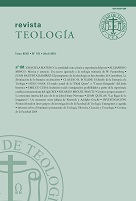Inclusión social e inmigración: Posibilidades a partir de la experiencia católica norteamericana del siglo XIX
Palavras-chave:
Inmigración, trabajadores, irlandeses, pastoral, democracia, catolicismo.Resumo
The issue of social inclusion is addressed with the intent that immigration can be perceived as an historic opportunity for the development of peoples, and not as a social threat. Shifting tides of human beings around the world in search of urgent solutions to their basic needs, is today one of the alarms for republican democracies and a new challenge to the old Catholic pastoral as always committed to human dignity. One country that has best solved the problem of immigration is the United States in the nineteenth century, which was able to include immigrants socially. It was the Catholic Church in America that was a determining factor in the process of social amalgamation. Analysis of Catholic pastoral regarding Irish immigration to America is a reference of how such a process of inclusion is possible. This essay will attempt to see which habe been the historical conditions and which decisions where taken by the State and Catholicism, in regards to the immigration of the working class. In this pastoral, political struggle for social rights of the working class immigrant, and his university education, have been determining factors in the processes of inclusion.Downloads
Downloads
Publicado
2020-03-25
Como Citar
Cuda, E. (2020). Inclusión social e inmigración: Posibilidades a partir de la experiencia católica norteamericana del siglo XIX. Teología, 47(101), 117–138. Obtido de http://200.16.86.39/index.php/TEO/article/view/2554
Edição
Secção
Artículos
Licença
Direitos de Autor (c) 2020 Teología

Este trabalho encontra-se publicado com a Licença Internacional Creative Commons Atribuição-NãoComercial-CompartilhaIgual 4.0.














 Teología
Teología